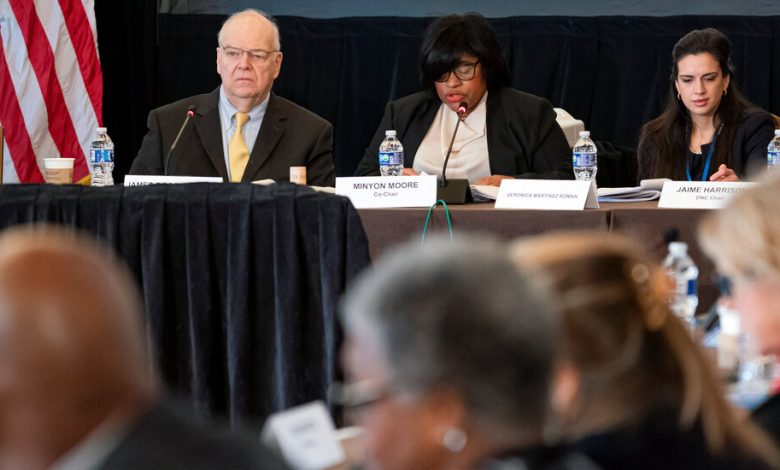Democrats Move a Step Closer to Making South Carolina First Primary

WASHINGTON — Over objections from some Democratic leaders, the Democratic National Committee on Friday moved one step closer to enacting President Biden’s vision for drastically overhauling the party’s 2024 presidential primary process, as a key committee voted to recommend sweeping changes to the calendar.
At a daylong gathering of the D.N.C.’s Rules and Bylaws Committee in a Washington hotel ballroom, members voted to recommend supporting a 2024 Democratic presidential primary calendar that would begin in South Carolina on Feb. 3, followed by New Hampshire and Nevada on Feb. 6, Georgia on Feb. 13 and then Michigan on Feb. 27. That plan reflected a framework Mr. Biden delivered to the committee on Thursday that emphasized racial and geographic diversity. Representatives from Iowa and New Hampshire voted against the proposal.
The recommendation, which upends the traditional Democratic order of Iowa, New Hampshire, Nevada and South Carolina, must be affirmed by the full D.N.C. early next year, but Mr. Biden’s preferences carry enormous weight with the party committee. Still, officials emphasized, the move by the Rules Committee is one step in what may still be a prolonged and contentious process. Tensions, pushback and questions about feasibility were immediately evident.
Some members of the committee expressed concern about having so many contests clustered tightly together at the beginning of February.
“One of the things that New Hampshire is known for is our retail politics, and candidates having the opportunity to engage the electorate face to face,” said Joanne Dowdell, a D.N.C. member from New Hampshire who opposed the proposal. “By having three states, one on top of the other, I think causes a little bit of conflict for candidates trying to vie for the attention, get name recognition and also raise money.”
The Biden Presidency
Here’s where the president stands after the midterm elections.
- A Defining Issue: The shape of Russia’s war in Ukraine — and its effects on global markets — in the months and years to come could determine President Biden’s political fate.
- Beating the Odds: Mr. Biden had the best midterms of any president in 20 years, but he still faces the sobering reality of a Republican-controlled House for the next two years.
- 2024 Questions: Mr. Biden feels buoyant after the better-than-expected midterms, but as he turns 80, he confronts a decision on whether to run again that has some Democrats uncomfortable.
- Legislative Agenda: The Times analyzed every detail of Mr. Biden’s major legislative victories and his foiled ambitions. Here’s what we found.
Other objections have been far louder.
New Hampshire has long held the nation’s first primary as a matter of state law, and state officials have said they intend to follow that law rather than any party decision. And the chairman of the Iowa Democratic Party noted in a statement that the country’s longtime leadoff caucus state has a law that “requires us to hold a caucus before the last Tuesday in February, and before any other contest.” The decision to pursue the latter would be up to the state central committee and elected officials, said Scott Brennan, a member of the Rules Committee from Iowa.
“Most Iowa Democrats are disappointed,” he said when asked about the mood of Democrats in his state. “And they should be. I think we made a very good pitch, and the fact that it sort of fell on deaf ears is painful.”
But D.N.C. rules have stipulated that any state that jumps the line to operate outside the party’s agreed-upon early window would face penalties — and candidates who campaign in those states would face repercussions as well. The issue was a subject of discussion on Friday afternoon.
“For decades we have said we will bear any sanctions,” said Raymond Buckley, the chairman of the New Hampshire Democratic Party.
Republican willingness, or lack thereof, to change dates may also be relevant in several states, including in Republican-controlled Georgia. A spokesman for Gov. Brian Kemp did not respond to a question on Friday afternoon about his reaction to the Democratic proposal.
The committee vote came a day after Mr. Biden sent a letter to members laying out his criteria for the early-voting window that emphasized diversity and rejected caucuses — effectively dealing a mortal blow to the troubled Iowa caucuses, which struggled for days to deliver results in 2020.
The proposed schedule rewards some of the states that powered Mr. Biden’s political comeback in 2020, elevating diverse, working-class and in some cases more moderate constituencies that were vital to Mr. Biden’s primary victory.
After he came in fourth place in Iowa and fifth in New Hampshire, two states with high percentages of white voters, he showed new signs of political life in Nevada. And it was South Carolina’s primary, with large numbers of Black voters, that revived his candidacy and propelled him through Super Tuesday and to the nomination.
“Defense, education, agriculture, manufacturing — South Carolina is a perfect laboratory,” said Representative James E. Clyburn, the South Carolina Democrat whose endorsement of Mr. Biden in 2020 played a vital role in the president’s victory in the state. “That’s why the people who do well in South Carolina end up doing pretty good in the general.”
Mr. Clyburn said that he had urged Mr. Biden to keep South Carolina in the early-state window — “first, second, third or fourth, didn’t matter to me” — but that he had learned of the state’s possible elevation to the kickoff primary on Thursday from the president.
Jaime Harrison, the chairman of the D.N.C., who is from South Carolina, said he had found out at Thursday night’s state dinner.